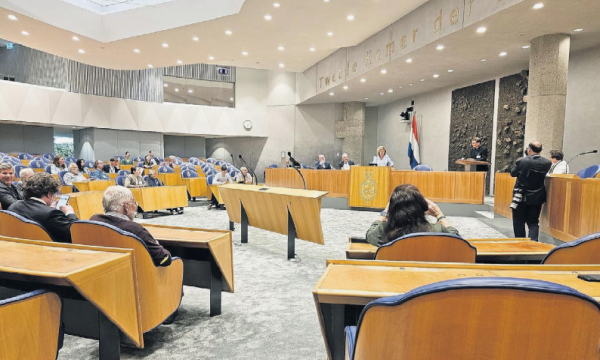Why are the incomes lower in the Caribbean Netherlands and how can the coordination of policy be improved for the islands so the money that The Hague spends can be more effective?
Regional journalists, including the correspondents of The Daily Herald and the Amigoe newspaper from Curacao, on Monday brainstormed and drafted questions on the consequences of decisions by the Dutch government on a local level, including the Dutch public entities Bonaire, St. Eustatius and Saba.

Close to 100 regional journalists came to the Dutch Second Chamber of Parliament on the invitation of Parliament for the so-called V-100, a yearly event that is held shortly after the Dutch government presents its annual report, including the annual reports of the individual ministries, of the previous budgetary year on the third Wednesday in May. On the same Wednesday, the investigation reports of the General Audit Chamber are published.
The V-100 participants were divided in eight groups who each delved into the documents pertaining to one specific theme. These themes included nature policy in relation to nitrogen goals, challenges of housing and care for senior citizens, the shortage of teachers, accessibility of public transportation, government’s digitisation information point and the fragmentation of policy information about the Canbbean Netherlands.
The groups formulated questions, with the assistance of researchers of the General Audit Chamber and staff members of the Analysis and Research Department of the Second Chamber. Member of the Second Chamber Jorien Wuite of the Democratic Party D66 joined the Caribbean Netherlands group to discuss the theme with the participants.
The Caribbean Netherlands group formulated 15 questions. The group asked why the information about Bonaire, St. Eustatius and Saba was presented in a fragmented way in the budget chapters and annual reports and why this information was not offered in a bundled manner.
The Caribbean Netherlands group asked to what extent the dividing of policy responsibility among the different ministries formed a risk for a consistent, effective and efficient policy for the islands, in particular for the social security, and how this risk could be mitigated. It was asked whether the coordinating role of the state secretary for Kingdom Relations was sufficiently legally secured.
As for poverty eradicating policy, the Caribbean Netherlands group asked whether there was sufficient attention for the low threshold accessibility of the Social Affairs and Labour SZW Units on the islands. The group wanted to know why there was a big difference in income between the Caribbean Netherlands and the Netherlands, how this related to poverty figures and what actions would be taken to reduce this difference in light of eradicating poverty.
The Caribbean Netherlands group further enquired about the deficient IT management of the Kingdom Department for the Caribbean Netherlands RCN and how this would be solved. They also asked for a specification of the apparatus cost of the RCN as a whole and per island, and the reported inconsistencies at the SZW Unit.
The questions of all eight groups were presented to Chairlady of the Second Chamber Vera Bergkamp at the end of the day in the plenary hall, in the presence of the journalists who sat in the chairs of the Members of the Second Chamber. This was a novum for the journalists who usually sit in the public area upstairs to cover the meetings. College Member of the General Audit Chamber Barbara Joziasse was present at the plenary session, and gave a short speech.
Members of the Second Chamber can use the journalists’ questions in the debates about the annual reports, while the questions will also be sent to the minister or state secretary involved for an official reply.
Monday’s V-100 event was opened by Chairman of the Second Chamber’s Committee for Government Spending and Secretary of the General Audit Chamber Cornelis van der Werf, who welcomed the group and explained the process of the annual reports and the Audit Chamber’s role.
The Daily Herald.

 Saba News News and Information from Saba Island, Dutch Caribbean
Saba News News and Information from Saba Island, Dutch Caribbean
